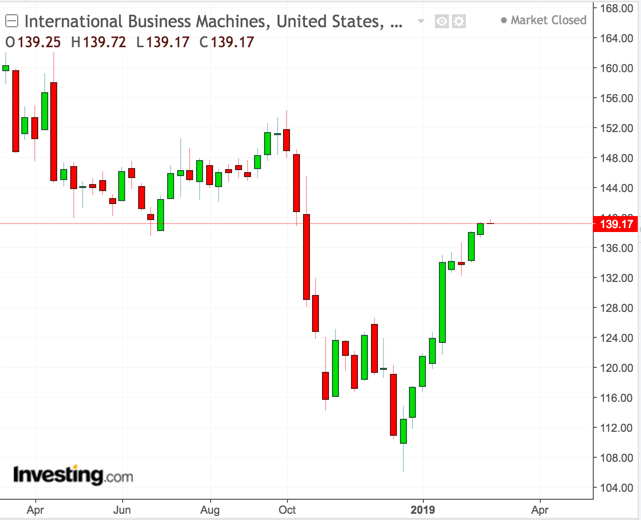International Business Machines (NYSE:IBM) shares are showing some strength, after a long slump. The momentum this year has been so strong that its stock has outperformed its top technology competitors, such as Amazon (NASDAQ:AMZN) and Alphabet (NASDAQ:GOOGL), by a wide margin.
Shares slipped 0.4% yesterday to close at $139.17, but have risen on 16 of the past 22 days, gaining 3.6% since Jan. 28. Fueling these gains is optimism that the company’s turnaround efforts are finally beginning to pay off, directing the century-old tech giant back onto solid footing and reversing the slowdown in its growth.

IBM bulls have focused on the company’s strong showing during the fourth-quarter of 2018 and its upbeat forecast for the current year, which it reported on Jan. 22.
Q4 revenue beat analysts' estimates to rise to $21.8 billion and the tech giant said it expects adjusted earnings per share of at least $13.90 in 2019, ahead of analysts’ predictions of $13.89. This was also the second quarter in a row in which IBM showed growth, after six years of revenue declines.
Despite the recent upsurge, IBM stock still remains about 36% down from its record high in 2013, testing the patience of the company’s buy-and-hold investors. However, since we recommended IBM for contrarian investors last March, we are becoming more confident that the company is on the right track to achieve its long-term turnaround plan.
Big Blue’s Blues
Big Blue, as it's sometimes referred to colloquially, has struggled during the past decade as technology and consumer preferences rapidly evolved, slowing revenue growth for this legacy tech giant. Its sales peaked in 2011 and free cash flows did so a year later. During this period, IBM exited some markets, invested in cloud data centers and bought a number of companies to boost sales, bolster technology offerings and add troves of data to help train artificial intelligence (AI) algorithms.
A recent survey by Morgan Stanley of the most senior technology officers, known as CIOs, shows that CEO Ginni Rometty’s efforts to refocus IBM’s business on the latest technologies—such as the cloud and artificial intelligence— are slowly gaining traction.
“IBM’s transformation has been slower than anticipated, but we see the company accelerating the pivot to growth as CIO priorities align with investments in Strategic Imperatives and combine with divestitures of non-core businesses,” Morgan Stanley said.
Though IBM has so far been slow to capture a leading market share in the new areas of the digital economy, such as cloud computing, the company’s recent $33-billion purchase of Red Hat (NYSE:RHT) could prove a game-changer. This acquisition will add a relatively high-margin software business to IBM’s stable of offerings, especially led by the company’s hybrid cloud services to corporate customers. About 85% of all enterprises are expected to adopt a hybrid cloud approach in which they generally use a mix of public cloud services like Amazon Web Services alongside their own private cloud networks, according to a forecast from Jefferies & Co.
For long-term investors whose aim is a steady income stream, owning IBM stock makes a lot of sense. The company plans to return about 70%-80% of free cash flow to shareholders each year, with annual dividend increases and continued share buybacks, and it expects to reduce its share count by roughly 2% annually.
Bottom Line
IBM stock continues to remain an attractive turnaround bet suitable for long-term investors with a 5-10 year time horizon. Despite the recent rally, its stock still yields 4.5%, higher than its five-year average dividend yield of 3.6%.
If you have the patience and power to hold on to this investment, IBM shares could prove a good value bet, especially after the company’s Red Hat acquisition and with its legacy businesses continuing to provide recurring cash flows.
